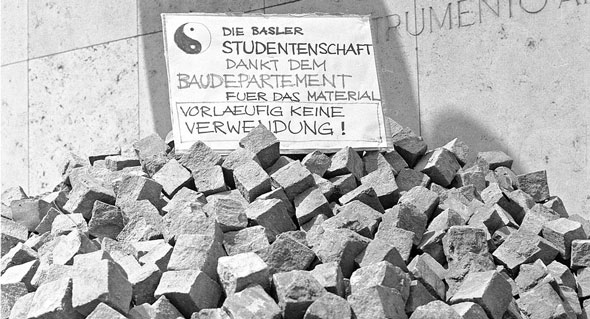Awakenings in the 1960s
The 1960s ushered in profound changes across society, which also affected the University of Basel. The surge in student numbers, a result of the baby boom generation, inevitably led to a push for reforms, while an accumulated backlog of reforms further increased this pressure. Overall, society witnessed a growing challenge to traditional values.
This gave rise to a dynamic that aimed not just for gradual reforms but for a fundamental – indeed unprecedented – overhaul of the entire university system. The prevailing ideas of this era of change were twofold: democratization of the educational process and modernization of teaching.
In terms of teaching, this meant collaboratively establishing course content, smaller class sizes, written materials over large lectures, exams with objectively defined standards, a focus on teamwork in research over authoritarian leadership, participation from outside the faculty in appointment processes, and transparency in university decision-making, among other things. And these various aims were all motivated by a range of assumptions and implemented with differing levels of intensity.
A perspective focused on results will ask first about the outcomes of these efforts. And here, it is crucial to distinguish between what can be explicitly identified and what can only be generally described. The former include the introduction of reformed study programs (such as the introduction of the licentiate in law around 1960), the creation of student subject groups in 1964, the transformation of the Senate into a university-wide body in 1970, and the rejection of the proposed new University Act in 1980.
As for the vital process of modernizing and liberalizing how the university functioned, changes can be reconstructed more through specific episodes and anecdotes that illustrate the trend rather than major milestones. This includes a number of student demonstrations and events, individual journalistic initiatives, and the experiences of those involved.
The Basel awakening was fueled by a mix of local, endogenous conditions and international, so to speak endogenous influences. Foreign models, often directly influenced by students’ own experiences abroad, along with media reports, catalyzed this local awakening. An example of this is the three-part series “Students in Revolt” by Hans Heinz Holz, published in early summer 1968 in the Basler National-Zeitung with provocative titles such as “The Untrustworthy Authorities,” “Inadequate Universities,” and “Protests and Riots” (on 5, 9, and 12 June 1968).



